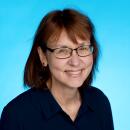Book Club: Jennifer Grey dishes on the stories behind ‘Dirty Dancing’
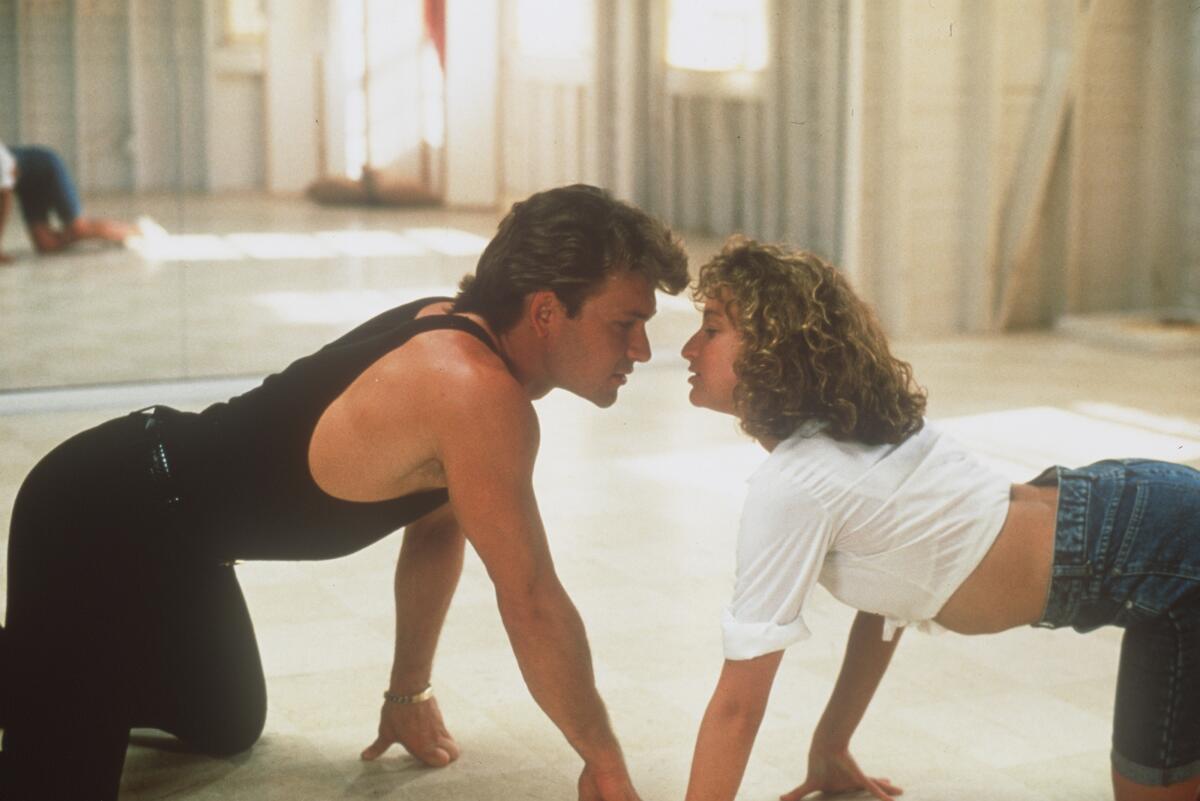
Jennifer Grey brings her memoir, ‘Out of the Corner,’ to the L.A. Times Book Club on July 29.
- Share via
Good morning, and welcome to the L.A. Times Book Club newsletter.
That was the summer of 1963 — when everybody called me Baby, and it didn’t occur to me to mind. That was before President Kennedy was shot, before the Beatles came, when I couldn’t wait to join the Peace Corps, and I thought I’d never find a guy as great as my dad. That was the summer we went to Kellerman’s….
And with that opening narration, Jennifer Grey’s character, Frances “Baby” Houseman, nose buried in a book and the Four Seasons on the family Oldsmobile’s radio, transported us all to Kellerman’s — and into the bygone era of the film “Dirty Dancing.”
After a breakout performance in “Ferris Bueller’s Day Off,” Grey brought her boom box to the “Dirty Dancing” audition and jumped at the chance for her first leading role. But in her new memoir, “Out of the Corner,” Grey says she never imagined the low-budget coming-of-age movie would become a hit, much less an endlessly quotable cultural icon.
Her book depicts a chaotic, “almost” cursed production that seemed to forebode box-office disaster. A few tidbits: The actress playing Baby’s mom got sick the second day of shooting and had to be recast on the spot. Last-minute script rewrites (Patrick Swayze resisted saying the now-famous line “nobody puts Baby in a corner”) interrupted a tight 45-day production schedule. Mosquitos swarmed as the crew struggled to create Kellerman’s Borscht Belt vibe at two different resorts in Virginia and North Carolina. Grey was a such a “mosquito magnet” that makeup artists had to cover up red welts across her body for close-up scenes with Swayze.
“There also was a long-running contest on set to see who could come up with the movie’s new title because surely Dirty Dancing was never going to last,” Grey writes in “Out of the Corner,” our July book club selection. “In the eighties it sounded too scandalous to be able to reach its mainstream target audience. Censorship officers assumed it was a porn film.”
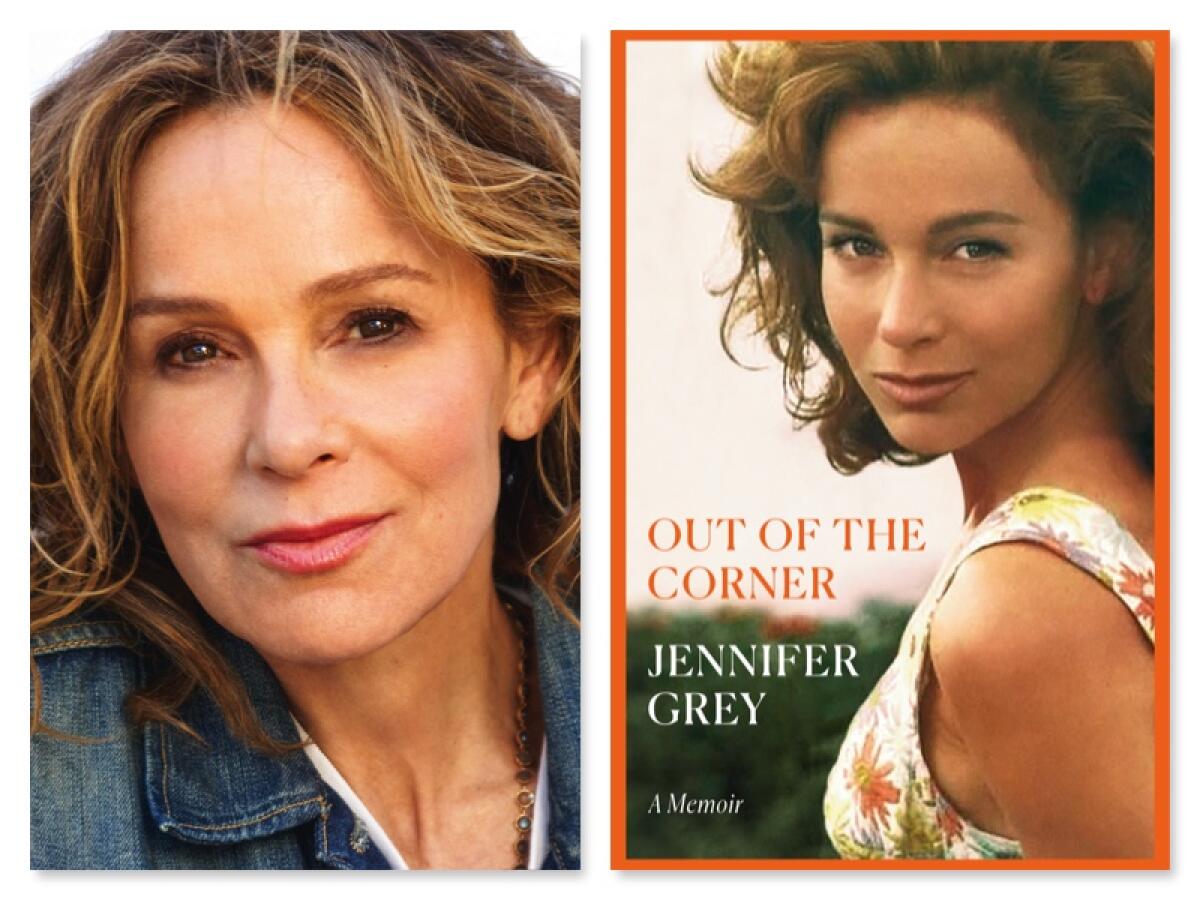
Yet the name stuck. “Dirty Dancing” opened in theaters Aug. 21, 1987. The clandestine summer love story, set in the era before Roe vs. Wade legalized abortion, blew up as a box office, video and streaming favorite whose appeal has yet to dim more than three decades later.
Fans know all the lines by heart (some of the best come from Penny: “God wouldn’t have given you maracas if he didn’t want you to shake them!”; and Johnny: “You just put your pickle on everybody’s plate, college boy, and leave the hard stuff to me”) and watch the movie over and over. My colleague Yvonne Villarreal told me this week she’s seen “Dirty Dancing” more than 100 times. “As a child, I broke my family’s VCR because one night I really wanted to watch the final dance number and snuck downstairs to pop it in ... but didn’t realize I put it in backward,” she says. “The tape got jammed. But I was like 7, so my dad was forgiving.” [Watch for Yvonne’s interview with Jennifer Grey coming later in July.]
Despite the movie’s popularity, Grey’s acting career stalled in the years after its release. She explains what happened in “Out of the Corner,” an easy read that offers a glimpse into her life growing up in a storied show business family, relationships with Matthew Broderick and Johnny Depp, and why she’s speaking up now.
On July 27, Jennifer Grey will be in conversation with Times reporter Amy Kaufman at the Montalban Theatre in Hollywood.
Join us: Get tickets on Eventbrite for this in-person book club talk, which starts at 7 p.m. Grey also will sign copies of her memoir at the event.
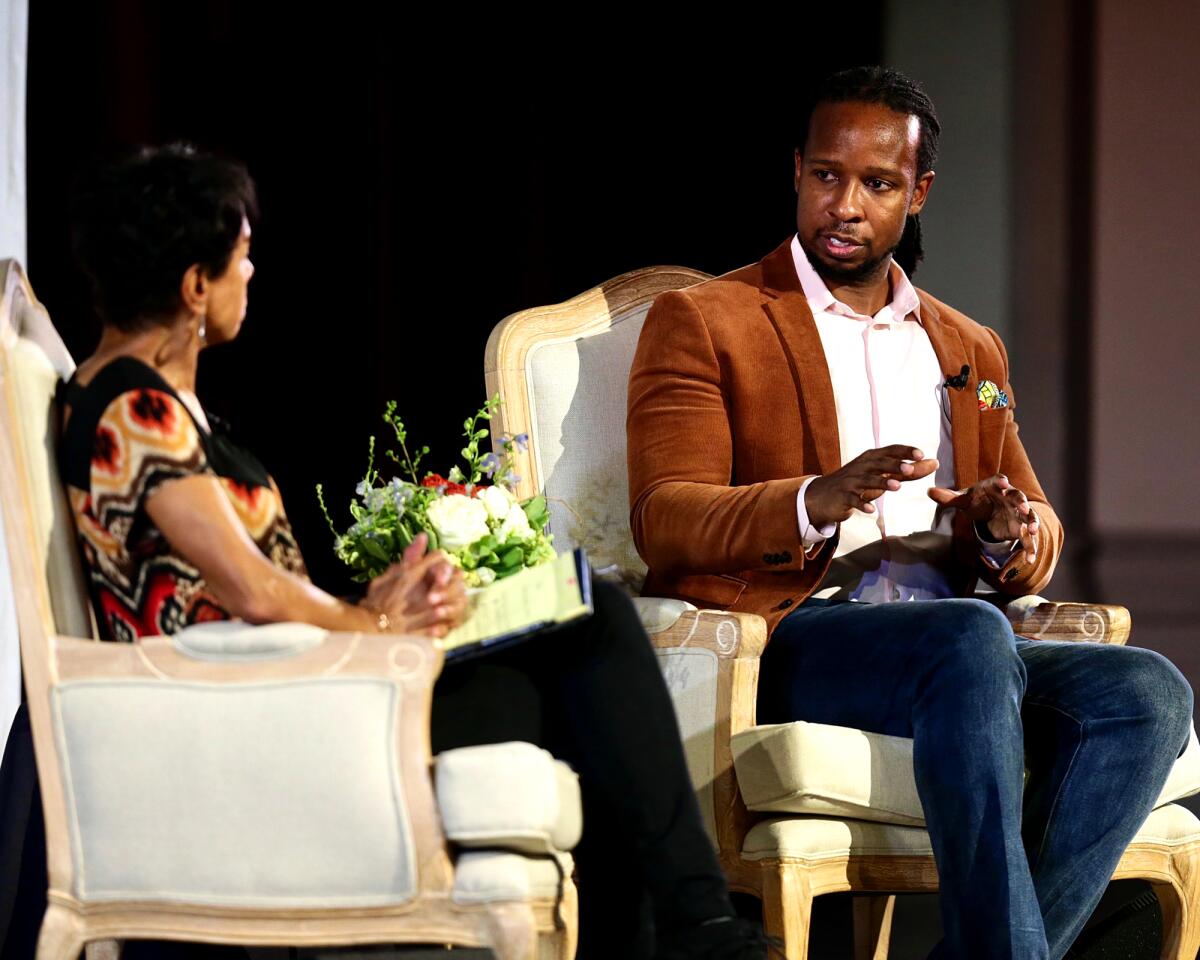
Talking to kids
National Book Award winner Ibram X. Kendi joined us at USC on June 22 to talk about his new bestseller, “How to Raise an Antiracist.”
“So how do we teach and prepare kids about racism without portraying the world as a completely terrible place?” columnist Sandy Banks asked him.
Kendi used the analogy of teaching a child to look both ways before crossing the street. “We’re telling them that there are dangers in society, and it’s incredibly important for you to protect yourself from those dangers, and if you actually do these things, then you won’t end up necessarily getting hit,” Kendi said.
“When we’re in that mind-set of teaching our children to look both ways, to always hold an adult’s hand when you’re crossing the street, we’re thinking fundamentally about protecting them,” he said. “That is our focus.”
Book club readers gave Kendi a standing ovation. My favorite response came in an email the next day from a recent Orange County high school graduate: “Quite honestly, because I’m not a parent, I was wondering beforehand if the conversation would still be relevant to me,” she wrote. “But those concerns were well washed away after the first question. I have two brothers; it was really empowering to know that I could be part of the change in their lives through simple nonverbal cues or discussions about the thin line between being antiracist/not racist.”
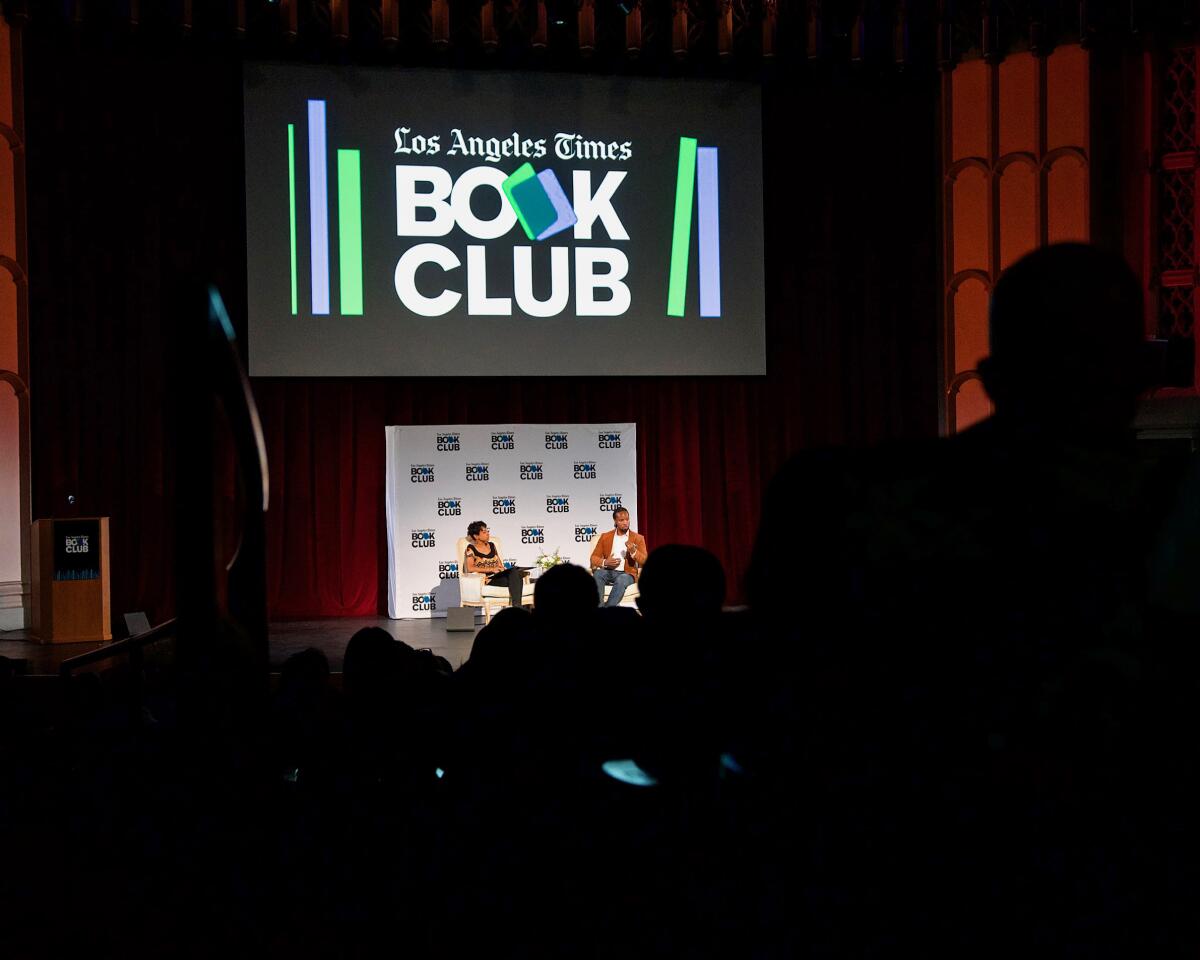
Q&A: Inside Access Books
At June book club night, we shared this must-watch video showing the joyful transformation of a school library in Compton.
The story is just one example of how the nonprofit Access Books is building and stocking school libraries in low-income neighborhoods. During the COVID school closures, Access also provided 260,000 new books in bundles of three or four to students in Los Angeles, Orange and San Bernardino counties.
This week, founder Rebecca Constantino shared more about her work and what’s ahead.
What is your favorite book to read with children? The Origami Yoda series and “Caps for Sale.”
What’s going on this summer? We partnered with L.A. Care to create seven libraries in various underserved communities in Los Angeles County. We will have a literacy carnival in Lynwood with an author visit, parent reading workshop, book giveaways and tacos!
What is Access planning for the school year? We have eight schools we are refurbishing. We have many schools on our waiting list — some that have NO books. We also will be providing numerous author visits and book giveaways.
You started Access Books in 1999 and also were active in L.A.’s foster care community, adopting two children. How has that influenced your work? Equity is very important to me. In our community and the larger society, the difference between those with opportunities and those without is getting larger. I saw serving as a foster parent as part of helping to provide equity to some children. One of my children, Sabine who is 15, has grown up coming to Access Books. It is a real joy to see her at events, taking charge, helping others and then coming home eager to read.
I really want for all children what I want for my own — safe schools, a great school library and a loving environment. Helping to create a library is one small part of equity. We have hundreds of volunteers a year, amazing donors and a dedicated staff.
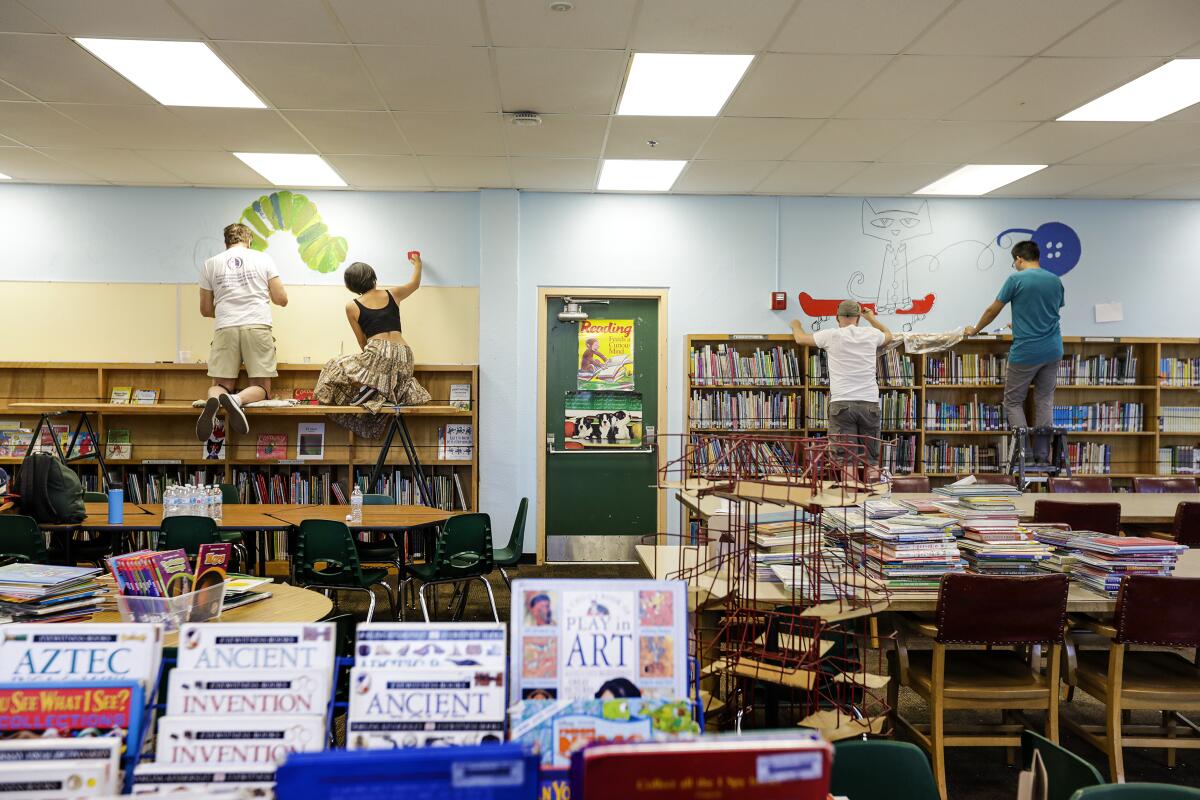
Keep reading
California’s future: After writing more than 30 books, California sci-fi master Kim Stanley Robinson has published his first work of general nonfiction, “The High Sierra: A Love Story.“ “When the pandemic shut down travel, I sat in my front courtyard and wrote every day, getting down everything I wanted to say about the Sierra,” he says in a new interview with David L. Ulin. “There was a lot of it, and there were a lot of different topics I wanted to cover, including my own Sierra memoir, the geology of the range, history of its people, some route suggestions and gear advice, a bibliography and so on.“
What makes L.A. the perfect noir setting? Times editor and novelist Jeffrey Fleishman, author of “Good Night, Forever” and “Last Dance,” explains at CrimeReads.
Inventive debut and Guy Fieri too. Joseph Han’s novel, “Nuclear Family,” tells not only the story of a Korean American family living in Hawaii but also a story-within-a-story about how that family was broken into pieces by the 1953 Korean divide. “Through laughter and wonder and intriguing complexity, Han makes us pay attention,” says reviewer Bethanne Patrick.
Desperation on the border. “I was a high school student when I read Luis Alberto Urrea’s 2004 book ‘The Devil’s Highway,’ about 14 Mexican men who died trying to cross the militarized border in 2001,” writes columnist Jean Guerrero. “It’s unfathomable that people continue to die in this way.”
Ask A Reporter. Foreign correspondent Jaweed Kaleem joined Times readers from London this week to talk about why so many Californians are moving to Portugal. Watch now.
New books for July. How did movie mogul Harvey Weinstein amass so much power, and what allowed him to escape consequences for so long? Ken Auletta’s new book, “Hollywood Ending: Harvey Weinstein and the Culture of Silence,” is featured on three July reading lists compiled by the Los Angeles Times, New York Times and Alta magazine, which all offer lighter summer fare too. Meanwhile, NPR offers a take on the best books of 2022 so far.
Audio boom. I’m always listening to audiobooks, a mix of new titles and stories I keep on repeat, during daily walks with my greyhounds. Looks like I’m not alone. Audiobook revenue rose 25% in 2021 — and 61% of parents said their children listened to audiobooks, which is way up from 35% in 2020, according to the Audio Publishers Assn. I’d love to hear what you’re listening to this summer around SoCal and on vacation. Share your latest favorites in an email to [email protected].
If you enjoy our community book club, please consider signing on to sponsor the newspaper’s signature literary programs through the new Los Angeles Times Community Fund.
Last word
My favorite underrated place to read? Entertainment audience engagement editor and book clubber Amy Wong likes the In-N-Out on Sepulveda just north of LAX. “Yes, it’s a little noisy and chaotic, but there’s something spiritually transportive about getting lost in a book and sipping on a Neapolitan milkshake as planes soar overhead,” she says. “If that sounds terrible to you, though, the Manhattan Beach Pier is a much more tranquil alternative. I’ve recently been poring over some of favorite books from my teen years — ‘The Hunger Games,’ ‘The Golden Compass,’ ‘Nick & Norah’s Infinite Playlist’ — and quite a few still hold up!”
Sign up for our Book Club newsletter
Get the latest news, events and more from the Los Angeles Times Book Club, and help us get L.A. reading and talking.
You may occasionally receive promotional content from the Los Angeles Times.
